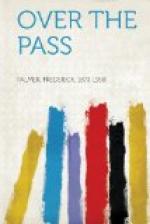“The honey of our prosperity brings us something besides the bees. It brings those who would share the honey without work,” said he. “It brings the Bill Lang hive and Pete Leddy.”
At the mention of the name, Jack’s and Mary’s glances met.
“You have promised not to tell,” hers was saying.
“I will not,” his was answering.
But clearly he had grasped the fact that Little Rivers was getting out of its patron’s hands, and every honest man in that community wanted to be rid of Pete Leddy.
“I should think your old friend, Cosmo de’ Medici, would have found a way,” Jack suggested.
“Cosmo is for talk,” said Mary. “At heart father is a Quaker.”
“Some are for lynching,” said Jasper Ewold, thoughtfully. “Begin to promote order with disorder and where will you end?” he inquired, belligerently. “This is not the Middle Ages. This is the Little Rivers of peace.”
Then, after a quotation from Cardinal Newman, which seemed pretty far-fetched to deal with desert ruffians, he was away again, setting out fruit trees and fighting the scale.
“And our Date Tree Wonderful!” he continued. “This year we get our first fruit, unless the book is wrong. You cannot realize what this first-born of promise means to Little Rivers. Under the magic of water it completes the cycle of desert fecundity, from Scotch oats and Irish potatoes to the Arab’s bread. Bananas I do not include. Never where the banana grows has there been art or literature, a good priesthood, unimpassioned law-makers, honest bankers, or a noble knighthood. It is just a little too warm. Here we can build a civilization which neither roasts us in summer nor freezes us in winter.”
There was a fluid magnetism in the rush of Jasper Ewold’s junketing verbiage which carried the listener on the bosom of a pleasant stream. Jack was suddenly reminded that it must be very late and he had far overstayed the retiring hour of the desert, where the Eternal Painter commands early rising.
“Going—going so soon!” protested Jasper Ewold.
“So late!” Jack smiled back.
To prove that it was, he called attention to the fact, when they passed through the living-room to the veranda, that not a light remained in any ranch-house.
“I have not started my talk yet,” said Jasper. “But next time you come I will really make a beginning—and you shall see the Date Tree Wonderful.”
“I go by the morning train,” Jack returned.
“So! so!” mused Jasper. “So! so!” he objected, but not gloomily. “I get a good listener only to lose him!”
But Jack was hardly conscious of the philosopher’s words. In that interval he had still another glimpse of Mary’s eyes without the veil and saw deeper than he had before; saw vast solitudes, inviting yet offering no invitation, where bright streams seemed to flash and sing under the sunlight and then disappear in a desert. That was her farewell to the easy traveller who had stopped to do her a favor on the trail. And he seemed to ask nothing more in that spellbound second; nor did he after the veil had fallen, and he acquitted himself of some spoken form of thanks for an evening of happiness.




